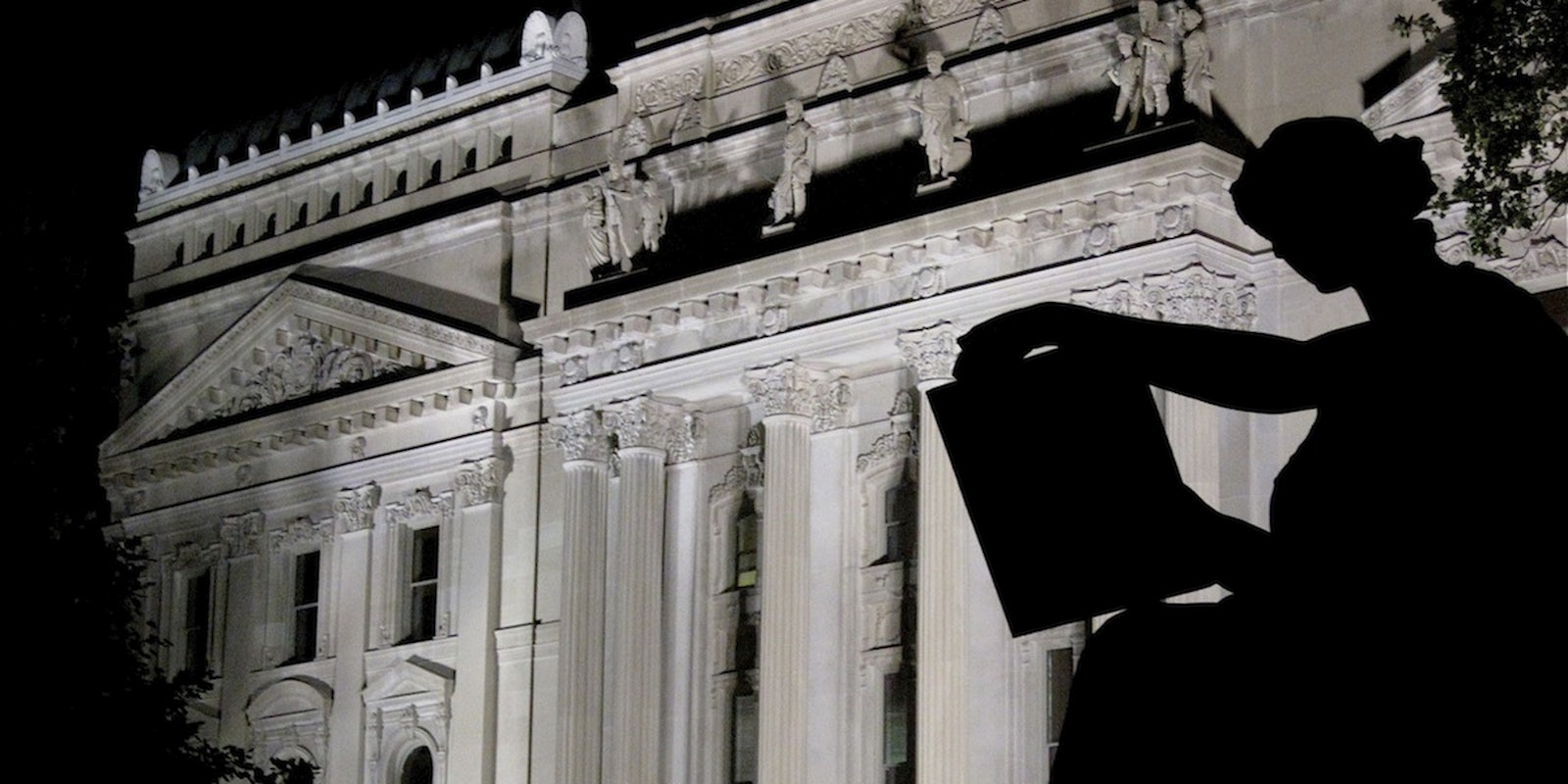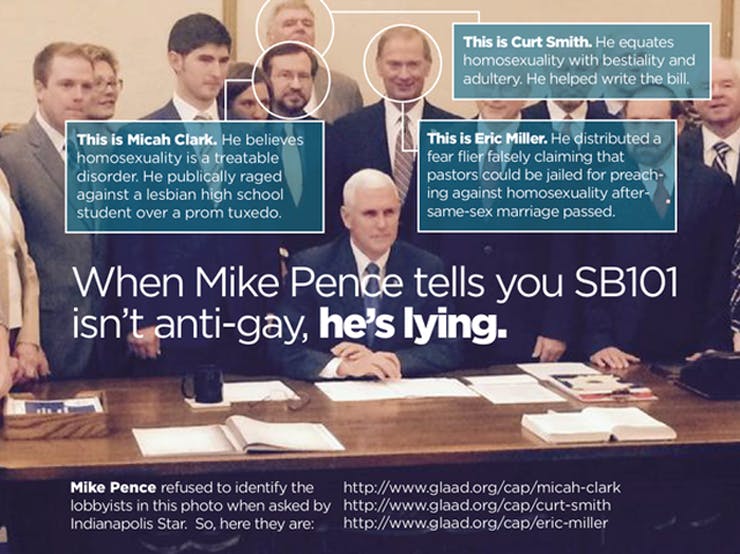You are the company you keep, as the moral goes.
What kind of company, then, does Indiana Gov. Mike Pence keep? The very worst, if you’re among the masses riled over his decision to sign Indiana’s new religious-freedom law.
To be fair, much of the rhetoric surrounding the Religious Freedom Restoration Act (RFRA) appears overblown, according to some legal experts. The RFRA may have an impact on cases involving religious objections, or none at all. Resolving its influence will fall on the judiciary, and it will do so on a case-by-case basis. In other words, the RFRA, which goes into effect July 1, does not automatically mean anyone can start discriminating against gay people or anyone else without potential consequences.
That does not mean, however, that the law is not intensely problematic.
Though scores of legal scholars are adamant the law requires a profound overhaul, as it stands, that’s perhaps more than Indiana Republicans are offering. Pence did ask the state’s legislature on Tuesday to amend the law so that it cannot be used to discriminate against gays and lesbians.
“I’ve come to conclusion that it would be helpful to move legislation this week that makes clear this law does not give businesses the ability deny services to anyone,” Pence said.
How the law will actually be applied by the courts is not the only consideration. As Indiana University pointed out in its statement on Sunday, the RFRA may be creating an “unwelcoming and discriminatory atmosphere,” the ramifications of which could be economically disastrous. For their own sake, lawmakers must correct the issue by amending the law—which they appear ready to do—or suffer.
Complicating matters is evidence that the law’s language, with all of its perceived flaws, reads exactly as intended by those who wrote it.
Over the past week, Pence and other conservatives figures have feigned outrage over accusations that it was concocted to disenfranchise LGBT citizens. Its principal architects, however, are the same people who tried (and failed) to maintain Indiana’s ban on same-sex marriage. It’s no coincidence that 24 “religious-freedom” laws have been proposed in 15 states this year, and that the U.S. Supreme Court will rule on marriage rights for gay couples nationwide later this year.
As for the company Pence keeps, alongside the religious leaders invited by him to celebrate the RFRA’s signing were several lobbyists who are, shall we say, less than sympathetic toward Indiana’s gay community.
Standing directly behind Pence at the ceremony was Micah Clark, head of the Indiana American Family Association, who admitted after the state’s same sex-marriage ban was lifted in October that his organization was focused on the RFRA as a means to empower businesses to turn away gay customers. Clark is well known for quoting—in reference to the Boy Scouts accepting gay youth—a Bible verse about drowning people who lead children into sin.
Eric Miller, founder of Advance America, is also seen in photographs standing within arms reach of Pence. Following the signing, Miller released a statement on his website, which read, “Churches, Christian businesses and individuals deserve protection from those who support homosexual marriages and those who support government recognition and approval of gender identity (men who dress as women).”
Miller, who is apparently fond of using the words “pedophile” and “homosexual” in the same sentence, goes on to specify that the bill will protect business owners who refuse access to gender-identity-appropriate restrooms. The state’s capital, Indianapolis, is one of the approximately 160 U.S. cities that have passed a law prohibiting gender identity discrimination.
Behind Miller at the signing stood Curt Smith, president of Indiana Family Institute, an organization that, in 2009, opposed expanding federal hate-crime laws to include violent acts motivated by sexual orientation. Smith’s group accused gay activists of using the death of Matthew Shepard, a gay man who was brutally beaten and tortured in 1998, as “propaganda.”
Despite repeated inquiries by the press, the governor’s office has refused to identify any of the people invited to the RFRA signing. Clark, Miller, and Smith either identified themselves by providing comments to the media, or third parties identified them.
GLAAD, and an organization that monitors LGBT issues in the media, published the image below this week to illustrate the lobbyists’ proximity to Pence.
In an op-ed for the Wall Street Journal published on Monday, Pence said, “I abhor discrimination,” adding, “If I saw a restaurant owner refuse to serve a gay couple, I wouldn’t eat there anymore.”
Pence said that if he were presented a bill that “legalized discrimination against any person or group,” he would veto it. But that statement has done almost nothing to quell the controversy, since Pence’s position is that the RFRA has nothing to do with gays and lesbians, despite claims to the contrary by the bill’s most vocal supporters.
Repeating a patently false claim, Pence writes that the Indiana law simply “mirrors” a federal version signed by President Bill Clinton in 1993.
It does not.
Indiana’s RFRA allows businesses (which are not covered under the federal version) the right to invoke the law as a legal defense in court, “regardless of whether the state or any other governmental entity is a party to the proceeding.” This is substantially different from the law signed by Clinton, which only applies to actions that involve the government—not private lawsuits between people and businesses.
On Tuesday, a family owned pizza shop in Walkerton, Ind., cited the RFRA while announced it would deny service to same-sex couples. “If a gay couple came in and wanted us to provide pizzas for their wedding, we would have to say no,” the owner, Crystal O’Connor, said.
“We’re not discriminating against anyone,” O’Connor, who calls her family’s Memories Pizza a “Christian establishment,” added, “that’s just our belief, and anyone has the right to believe in anything.”
Photo by Alan Levine/Flickr (CC BY-SA 2.0)



